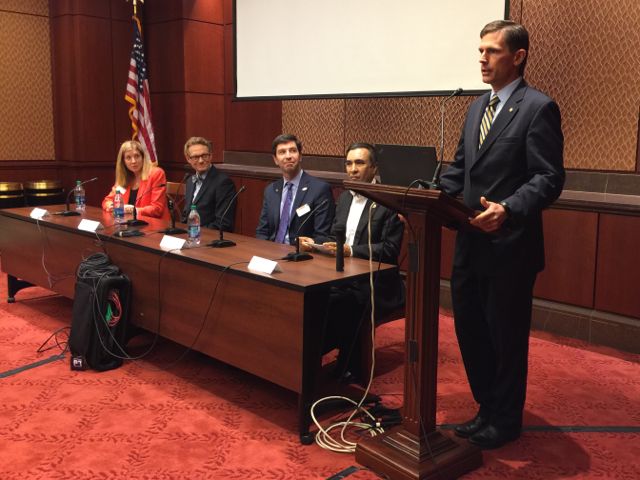PHOTO: Heinrich Highlights Success Of UNM Project ECHO As Model For Boosting Access To Quality Health Care In Remote Communities

(PHOTO: U.S. Senator Martin Heinrich with (left to right) Dr. Kathleen Schmeler, Director of MD Anderson Cancer Center, University of Texas; Dr. Terry Box, Associate Professor and Director of Project ECHO, University of Utah; Dr. John Scott, Medical Director of Telehealth, University of Washington; and Dr. Sanjeev Arora, Director, Project ECHO, University of New Mexico, Health Sciences Center.)
WASHINGTON, D.C. - At an event in the U.S. Capitol today, U.S. Senator Martin Heinrich (D-N.M.) highlighted Project ECHO (Extension for Community Healthcare Outcomes), a program started by the University of New Mexico (UNM) that has become a national model for providing remote communities access to high-quality health care resources. Project ECHO uses technology-enabled collaborative learning to support community providers and dramatically increases access to specialty treatment in remote and underserved areas. Senator Heinrich opened the discussion by introducing UNM physician and director and founder of Project ECHO Dr. Sanjeev Arora.
Senator Heinrich is a cosponsor of S. 2873, the Expanding Capacity for Health Outcomes (ECHO) Act, a bill to boost access to high-quality health care in hard-to-reach regions. The bill, sponsored by U.S. Senators Orrin Hatch (R-Utah) and Brian Schatz (D-Hawaii), aims to better integrate the Project ECHO model into health systems across the country.
"Families across New Mexico, including in our rural and tribal communities, deserve access to high-quality health care no matter where they live," said Sen. Heinrich. "Project ECHO, started by the University of New Mexico, is using technology to train and connect health care specialists to patients in our underserved communities. This will help address some of our health care system's biggest disparities in rural areas and is the national model for telehealth. I'm proud this pioneering work originated in New Mexico, and I will continue working to ensure we find innovative ways to boost health care access across the state."
Through Project ECHO, specialists provide direct care or consultation to patients via video conferencing. Under the ECHO model, specialists at a large medical center consult with primary care providers in rural or underserved communities on how best to treat complex conditions. This mentoring and training -- through teleECHO video conferencing clinics -- expands access to care, and research has shown that it is improving care.
Specifically, the ECHO act:
- Requires the Secretary of the U.S. Department of Health and Human Services (HHS), in collaboration with the Health Resources & Services Administration (HRSA), to prioritize analysis of the model, its impacts on provider capacity and workforce issues, and evidence of its effects on quality of patient care.
- Requests a GAO report regarding opportunities for increased adoption of such models, efficiencies and potential cost savings from such models, ways to improve health care through such models, and field recommendations to advance the use of such models.
- Requires the HHS Secretary to submit a report to Congress on the findings of the GAO report and the HHS report, including ways such models have been funded by HHS and how to integrate these models into current funding streams and innovative grant proposals.
Learn more about Project ECHO at http://echo.unm.edu and view a brief video explaining the ECHO model.